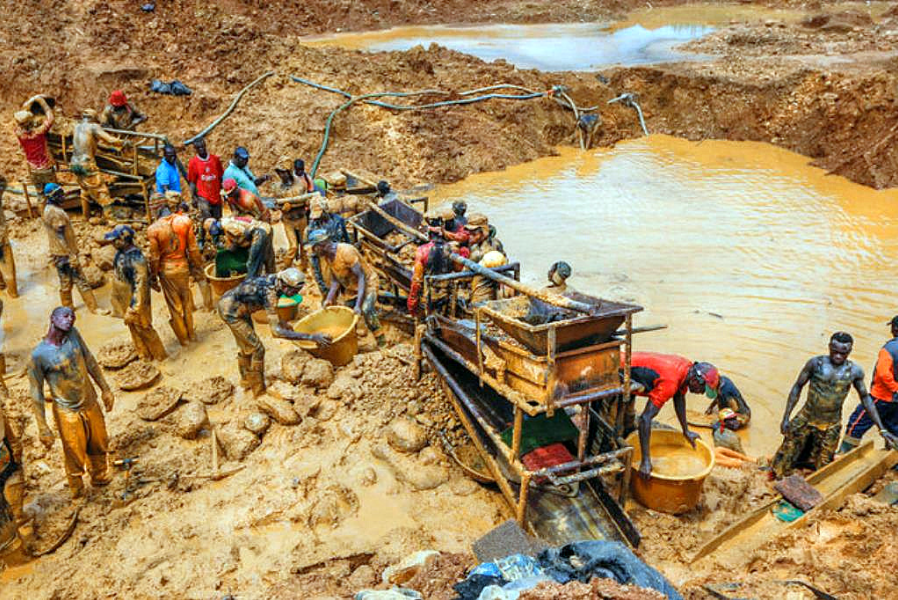From gleaming gold to vital coal, Nigeria boasts a treasure trove of natural resources: zinc, limestone, phosphate, and uranium. Despite this abundance, maximum utilisation has been below par due to illegal mining. The unfortunate reality is that illegal mining has become a rampant issue across the country, causing destruction and devastation to host communities. Illegal mining has been a pervasive problem in various states of Nigeria, including Zamfara, Benue, Nasarawa, Benue, Bauchi, and others. These activities have led to the depletion of the nation’s natural resources and resulted in significant environmental degradation, health hazards, and socio-economic instability.
Some states have been identified as hotspots of illegal mining in Nigeria. Illegal mining has persisted in Zamfara’s gold-rich area. The lucrative nature of gold mining and unregulated mining practices have attracted criminal groups, resulting in regional disputes and instability. Plateau State, known for its rich natural resources, has recorded illicit mining activities in the North Central region, including tin, columbite, and diamonds. Niger State has witnessed sand mining from riverbeds and floodplains without proper permissions, which has resulted in erosion and loss of agricultural lands. In Southern Nigeria, particularly Enugu state, illegal mining has also been recorded with numerous arrests of illegal miners.
Illegal mining poses security implications, especially for the affected states. According to reports, around 80 per cent of mining in the Northwest region is done illegally and artisanally by local inhabitants. Illegal mining has exacerbated conflict and instability in impacted areas. The proceeds from illegal mining are frequently channelled into criminal networks, worsening social vices and hurting local economies. According to the Katsina State Government, illicit mining is the wheel that pushes armed banditry in Katsina and adjacent Northwest Nigerian states.
The Federal Government has taken steps to address this issue through the Ministry of Solid Minerals Development. The government recently deployed a specialised security architecture of 2,220 security personnel to combat illegal mining and enforce the nation’s mining laws. These officers, known as the “Mining Marshal Corps,” have been trained to identify and apprehend individuals involved in illegal mining activities. The corps has been mandated to not only crack down on illegal mining operations but also to curb theft and other nefarious activities related to mineral resources. The government aims to maximise the benefits derived from its God-given resources and contribute to the nation’s economic development.
The continued occurrence of illegal mining emphasises the need to strengthen legal frameworks and regulations, improve monitoring and surveillance systems, and promote sustainable mining practices. By implementing stricter penalties for illegal mining activities and ensuring swift prosecution of offenders, the government can deter individuals from engaging in such activities and create a deterrent effect. Furthermore, the continued problem of illegal mining reveals the need to provide alternative livelihood opportunities for individuals. Many individuals turn to illegal mining due to limited economic opportunities and a lack of access to formal employment. By investing in vocational training programs, agricultural initiatives, and other income-generating projects, the government can provide viable alternatives for these individuals, reducing the incentive for engaging in illegal mining.
In addition to the current move by the federal government to curb illegal mining in Nigeria, there is a need to reinforce the regulatory framework by improving current legislation and imposing harsher penalties for illicit mining. There should be enhanced collaboration among government entities in monitoring and enforcement. Arguments abound that, based on the size of the country, the federal government lacks the necessary resources to pre-empt all illegal minerals miners’ activities. However, cooperation between security agencies has tried to tighten the noose, but more needs to be done, especially in creating and operating an exceptional security architecture. There is also a need to implement programs to provide alternative sources of income and job opportunities for individuals involved in illegal mining. This can include vocational training, entrepreneurship support, and investment in industries that promote sustainable development. Illegal mining in Nigeria is a complicated problem with negative consequences for the environment, economy, and society. It necessitates a response that includes stronger restrictions, enhanced law enforcement, community participation, and long-term livelihood options. Illegal mining significantly threatens Nigeria’s natural resources, environment, and socio-economic stability. The government’s recent deployment of the Mining Marshal Corps is a commendable step towards curbing this practice.



